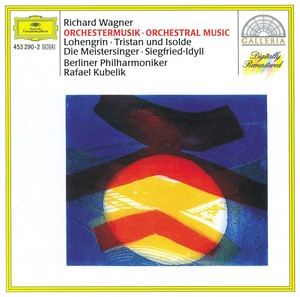
Richard Wagner (1813-1883)
Die Meistersinger OverturePreludefrom Lohengrin Act I
Siegfried-Idyll
Prelude and Liebestod from Tristan und Isolde
Berlin Philharmonic Orchestra/Rafael Kubelík
rec. February 1963, Jesus-Christus Church, Berlin
Presto CD
Deutsche Grammophon 453 290 2 [59]
It may be of some surprise to the casual observer to note than in his very fine series of Conspectuses of operas, Ralph Moore’s top recommendations for both Die Meistersinger and Parsifal were recordings conducted by Rafael Kubelík, and although Ralph did not do a similar survey for Lohengrin, in his ‘Untouchables’ posting Kubelík’s 1970 recording emerged as the joint top recommendation with Kempe’s studio recording for EMI in 1963. Yet Kubelík’s name is not always associated with the music of Wagner in an era when he was out-muscled in this repertoire by Solti, Karajan, Böhm and perhaps even Klemperer; to ignore Kubelík, however, would be very much to any listener’s loss.
This set of Wagner orchestral music from 1963 is unusual in the sense that it was not made with Kubelík’s own orchestra, the Bavarian Radio Symphony, but rather with Herbert von Karajan’s Berlin Philharmonic Orchestra. In those days, conductors jealously guarded who conducted and recorded what with ‘their’ own orchestras, so it is something of a surprise to find Karajan allowing another conductor to perform and record with the BPO music that he probably regarded as part of his core repertoire. However, by all accounts, he tremendously admired Kubelík’s artistry and as a consequence we are all the beneficiaries of this very fine album, now re-released on compact disc once more in Presto Classics ‘On Demand’ series (in addition to it already being available as a download in the usual mp3 and FLAC formats).
I first came across this recording on compact disc too many years ago to declare publicly, when it was released as a two-fer by the French branch of Deutsche Grammophon coupled with Eugen Jochum’s legendary recording of the Parsifal Prelude and Good Friday Music, an exciting Ride of the Valkyries from Karajan’s complete recording of the opera, as well as some rather stolid Tannhäuserexcerpts directed by Otto Gerdes. There is little difference in the quality of the very fine mid-1960’s sound from either that issue or the current standalone album which is part of Deutsche Grammophon’s Galleria series and has the bonus of a short essay on Wagner’s music by Monika Lichtenfeld in English, German and French.
I have always found Kubelík’s Wagner absolutely fascinating, not least when compared with many of his colleagues working in the same repertoire during this era. If George Szell in Cleveland recorded bleeding chunks of this music where the blood was red-hot and still dripping from the score, then Otto Klemperer’s way was more Fafner-like in dragging blocks of Valhalla to construct huge monuments in sound, whereas with Karajan the emphasis was on the grandeur and sentient power in the music. Compared to these three, Kubelík’s approach is warmer and more humane, not qualities you would necessarily associate with Wagner, but they are all there in the music nonetheless and are wonderfully teased out under Kubelík’s baton. In particular, in the Siegfried-Idyll here, the listener is treated to a gloriously relaxed and winning performance where the music positively glows with warmth and affection. Similar qualities can be heard in the Lohengrin Prelude, with especially radiant string playing from the Berlin Philharmonic during the opening and closing stages of the music. If over the years there has been a small thread of criticism about this recording since its release, it has been because occasionally the music-making can be a little too relaxed, a point perhaps reinforced when comparing Kubelík’s rendition of the Die Meistersinger Overture on this recording with the identical piece taped by Karajan and the same orchestra, in a similar collection of Wagner works, some ten years later for EMI. There, the music-making is almost overwhelming in its panache and grandeur, arguably a bit too much so, with the everyday folk of Nuremberg being elevated to the level of the mythical knights and fortresses of Trabant; it is thrilling, nonetheless. Kubelík is more modest in his aims, his priorities being evidenced during the closing pages where he expertly balances the orchestra so that Wagner’s contrapuntal writing can be heard with a crystalline clarity, whereas Karajan is more concerned with mounting excitement and grandeur. One can draw similar conclusions with the Prelude and Liebestod from Tristan und Isolde; in the Prelude, Kubelík is unable to match the searing intensity of Karajan on EMI, nor is he as overwhelmingly ecstatic as his colleague in the climax of the Liebestod, but I am nonetheless still bowled over by the sheer range of colours Kubelík is able to inspire from the Berlin players within that glorious, crowning moment at the climax, which means that this is a version of an oft-recorded piece that will always have a place in my collection.
My conclusion is that this is an album that should occupy a similar position in yours, if it doesn’t already.
Lee Denham
Help us financially by purchasing from



















